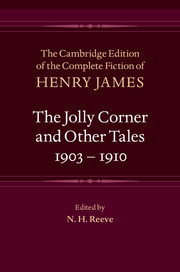Book contents
- Frontmatter
- Contents
- Acknowledgements
- List of Abbreviations
- General Editors’ Preface
- General Chronology of James’s Life and Writings
- Introduction
- Textual Introduction
- Chronology of Composition and Production
- Bibliography
- The Jolly Corner and Other Tales 1903–1910
- Glossary of Foreign Words and Phrases
- Notes
- Textual Variants
- Emendations
- Appendices
IV
Published online by Cambridge University Press: 11 April 2021
- Frontmatter
- Contents
- Acknowledgements
- List of Abbreviations
- General Editors’ Preface
- General Chronology of James’s Life and Writings
- Introduction
- Textual Introduction
- Chronology of Composition and Production
- Bibliography
- The Jolly Corner and Other Tales 1903–1910
- Glossary of Foreign Words and Phrases
- Notes
- Textual Variants
- Emendations
- Appendices
Summary
There would have been a wonder for us meanwhile in his continued use, as it were, of his happy formula—brought out to Cornelia Rasch within ten minutes, or perhaps only within twenty, of his having settled into the quite comfortable chair that, two days later, she indicated to him by her fireside. He had arrived at her address through the fortunate chance of his having noticed her card, as he went out, deposited, in the good old New York fashion, on one of the rococo tables of Mrs. Worthingham's hall. His eye had been caught by the pencilled indication that was to affect him, the next instant, as fairly placed there for his sake. This had really been his luck, for he shouldn't have liked to write to Mrs. Worthingham for guidance—that he felt, though too impatient just now to analyze the reluctance. There was nobody else he could have approached for a clue, and with this reflection he was already aware of how it testified to their rare little position, his and Cornelia’s—position as conscious, ironic, pathetic survivors together of a dead and buried society—that there would have been, in all the town, under such stress, not a member of their old circle left to turn to. Mrs. Worthingham had practically, even if accidentally, helped him to knowledge; the last nail in the coffin of the poor dear extinct past had been planted for him by his having thus to reach his antique contemporary through perforation of the newest newness. The note of this particular recognition was in fact the more prescribed to him that the ground of Cornelia's return to a scene swept so bare of the associational charm was certainly inconspicuous. What had she then come back for?—he had asked himself that; with the effect of deciding that it probably would have been, a little, to “look after” her remnant of property. Perhaps she had come to save what little might still remain of that shrivelled interest; perhaps she had been, by those who took care of it for her, further swindled and despoiled, so that she wished to get at the facts. Perhaps on the other hand—it was a more cheerful chance—her investments, decently administered, were making larger returns, so that the rigorous thrift of Bognor could be finally relaxed.
- Type
- Chapter
- Information
- The Jolly Corner and Other Tales, 1903–1910 , pp. 334 - 340Publisher: Cambridge University PressPrint publication year: 2017

